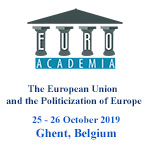Euroacademia Conferences
 Europe Inside-Out: Europe and Europeanness Exposed to Plural Observers (9th Edition) April 24 - 25, 2020
Europe Inside-Out: Europe and Europeanness Exposed to Plural Observers (9th Edition) April 24 - 25, 2020 Identities and Identifications: Politicized Uses of Collective Identities (9th Edition) June 12 - 13, 2020
Identities and Identifications: Politicized Uses of Collective Identities (9th Edition) June 12 - 13, 2020 8th Forum of Critical Studies: Asking Big Questions Again January 24 - 25, 2020
8th Forum of Critical Studies: Asking Big Questions Again January 24 - 25, 2020 Re-Inventing Eastern Europe (7th Edition) December 13 - 14, 2019
Re-Inventing Eastern Europe (7th Edition) December 13 - 14, 2019 The European Union and the Politicization of Europe (8th Edition) October 25 - 26, 2019
The European Union and the Politicization of Europe (8th Edition) October 25 - 26, 2019 Identities and Identifications: Politicized Uses of Collective Identities (8th Edition) June 28 - 29, 2019
Identities and Identifications: Politicized Uses of Collective Identities (8th Edition) June 28 - 29, 2019 The European Union and the Politicization of Europe (7th Edition) January 25 - 26, 2019
The European Union and the Politicization of Europe (7th Edition) January 25 - 26, 2019 7th Forum of Critical Studies: Asking Big Questions Again November 23 - 24, 2018
7th Forum of Critical Studies: Asking Big Questions Again November 23 - 24, 2018 Europe Inside-Out: Europe and Europeanness Exposed to Plural Observers (8th Edition) September 28 - 30, 2018
Europe Inside-Out: Europe and Europeanness Exposed to Plural Observers (8th Edition) September 28 - 30, 2018 Identities and Identifications: Politicized Uses of Collective Identities (7th Edition) June 14 - 15, 2018
Identities and Identifications: Politicized Uses of Collective Identities (7th Edition) June 14 - 15, 2018
One Belt One Road Initiative Nexus to the European Union and China Relations: A New Economic Debunching?
-
-

-
Presentation speakers
- Elif Uçkan Dağdemir, Anadolu University, Turkey
Abstract:
One Belt One Road (OBOR) Initiative has become one of the driving forces of the Chinese political economy since its launch by the Chinese President Xi Jinping in September 2013. OBOR Initiative has considered as a repercussion of his New Silk Road dream, as mostly referred to Great Renaissance of the Chinese Nation. However, this Chinese dream is directly related with the economic well-being since it intends to assure new markets for the Chinese exports by investing on the logistics between China and the Europe while helping to combat with development imbalances and poverty within China. Once achieved, such a comprehensive project would certainly let China to steer the world economy-politics as a whole. The launch of the OBOR Initiative coincides not only with the protectionist policies which has begun soon after the global financial crises of 2008 and accelerated along with the new United States (US) administration but also the revitalization of the European Union (EU) economy along with comprehensive macroeconomic plans and inflow of foreign direct investment. In this respect, China’s willingness to make a substantial contribution to the so-called Juncker Plan made the OBOR Initiative more tempting for the EU. Last but not least, it comes across at a time of seeking for new-age partnerships so as to respond the deadlock of the multilateral trading system.
The aim of this paper is to quest the conformity of the OBOR Initiative with the respective demands of the EU and China for their economic development and well-being. In this respect, prospective bridging role of the OBOR Initiative in enabling the economic connectivity between EU and Asia is evaluated. So as to conclude, probability of the OBOR Initiative in giving a fresh blood to the multilateral trading system via foreign direct investment veins is elaborated as a whole. -
Related Presentations

The Sin of Indifference: Europe and the Ancient Greece
- Firat M. Haciahmetoglu

Ordine Nuovo and the Idea of Europe
- Pier Paolo Alfei













